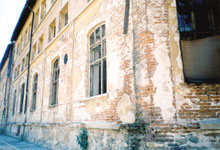Bulgaria torn by temptations, realities

Jews were prisoned in warehouses like this famous one in Dupnidza, Bulgaria, while waiting to be deported to death camps in other countries.
There are numerous theories explaining why Bulgaria chose to participate in World War II as Germany’s ally. One of them is that a pro-German government had already been installed by the beginning of the war. The country was ruled by a coalition headed by Bogdan Filov, the prime minister — a distinguished scholar but at the same time also a notorious anti-Semite. Peter Gabrovski, the minister of the Interior, was similarly known for his anti-Jewish sentiments. The formal alliance with Germany was established in 1941, which allowed German troops to pass through the Bulgarian territories. In return for this important access, Germany promised to give Bulgaria territories (Macedonia, and Thrace) lost during World War I and over which it had long claimed sovereignty. Nowadays, many historians believe Bulgaria made a wise decision, because if it had not participated in the war on the side of Germany, Bulgaria would have had a similar destiny to Yugoslavia and Greece, which were completely destroyed by the German troops.
However, there was an additional requirement for the desired territories: the Law for the Defense of the Nation, which not only restricted Jewish participation in Bulgarian life, but also imposed specific taxes on Jews. According to the Law of the Defense of the Nation, a “Jew” was anybody with at least one Jewish parent. Jews were obliged to change their names to Jewish names and to always wear the Star of David. All Jewish shops were closed and merchandising was forbidden.
However, no matter how popular the idea of repossession of the lost lands was among the Bulgarians, the anti-Semitic laws were not accepted by the population. The Jewish community was well integrated into the Bulgarian society. Talented individuals occupied high positions: Professor Yossif Fadenchecht became minister of justice; Yossif Herbst was director of the press at the Ministry of Foreign Affairs; Boris Shatz was director of the Academy of Fine Arts; and Dora Gabe was a leading poetress.
Jews were treated as equals by Bulgarian society. Hundreds of protests were sent to the king and the prime minister. The Germans soon started to complain about the laxity of enforcement of the Law of the Defense of the Nation, accepted in 1941. In “Separation of Church and Reich,” Jeff Lipkes comments, “The size of the Stars of David that all Jews were required to wear was the smallest in all Europe, and only 20 percent of the total number of stars set to be manufactured was actually made.” But if there was little anti-Semitism in general, according to Lipkes, “admirers of Hitler had gained powerful positions in Bulgaria’s government and they had plans to implement Hitler’s Final Solution — the extermination of all Jews.”
In March 1943, the Jews from Macedonia and Thrace were deported to Auschwitz. Omer Bartov says in The Anti-Hero as Hero, “of 11,343 people, only 12 are said to have survived.” However, the Bulgarian government could do little because the Jews in the areas of Thrace and Macedonia were not considered Bulgarian citizens.
Shortly after that came the order for the transportation of all the Jews in the old kingdom, Bulgaria, to the concentration camps. But what happened is unique: the whole country opposed the deportation, and not one single Bulgarian Jew was sent to the camps.
Here are the stories of four people who are believed to deserve the credit for saving 50,000 Jewish lives.
Your donation will support the student journalists of Missouri Southern State University. Your contribution will allow us to purchase equipment and cover our annual website hosting costs.



























